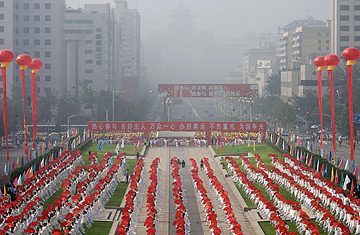
Chinese performers dance to welcome the one year countdown to the 2008 Beijing Olympic Games in Beijing, China.
On Wednesday night 10,000 people gathered in Beijing's Tiananmen Square, and millions more watched on television, as the city celebrated an event that's now exactly a year away — the opening of the 2008 Summer Olympics. China has reason to get the party started a little early: As could be expected of the world's largest authoritarian state, infrastructure preparations for the Games have been pushed through with remarkable speed. But that doesn't mean that China is quite ready to welcome the world. Beijing's air is still terrible, and the government is ill-prepared for the growing attention of the world's media. Here's a look at where China is ready for the Games, and where it isn't:
Construction. Unlike Athens, which was racing to complete stadiums right up until the start of the 2004 the Summer Games, Beijing is on pace to finish much of the building requirements well ahead of next August. Of the 37 competition venues, 36 are scheduled to be finished this year, including the bubble-sided Beijing National Aquatics Center and the new Wukesong Indoor Stadium, according to the Beijing Olympic Committee. The National Stadium, with its iconic "birds nest" design, will be finished in early 2008. A new north-south subway line is set to open in September, but other transportation improvements will be cutting it close. While Olympic committee members touted "significant construction progress" on five rail lines in an Aug. 6 press conference, completion of some key routes is not scheduled until next summer. Two more subway lines are scheduled to be finished next June, while an express train from the airport won't be running until July.
Pollution. Getting these public transportation projects finished is important because cars have become a major contributor to Beijing's noxious air, and 1,000 more are registered in the city every day. City officials said Monday that air quality is improving, but the rarity of blue skies in the capital shows that much work still needs to be done. On most days it seems unwise to go for a jog, much less run an Olympic marathon. But Beijing could have one unique contingency plan. "A temporary measure — which perhaps no government in the world except for China could do — is to shut down cars," says Zhang Hongjun, a lawyer and former official in China's State Environmental Protection Agency. "That must be a reality for the Olympics." City officials say they haven't decided on specific plans for reducing car traffic during the Games, but there is a precedent for the idea. During a summit with African leaders last fall a half million official vehicles were taken off the road for nearly a week.
Human Rights. The Chinese government wants to keep political activists from spoiling its Olympic party. But if recent days are any precursor of what will come next year, Beijing won't have its way. An aide to Steven Spielberg told ABC News last month that the producer would reconsider his role as an artistic adviser to the Games' opening ceremony if China didn't take a tougher stand on the government of Sudan over the Darfur crisis. Days later Beijing went along with a plan to send U.N. peacekeepers to the war-plagued region. While a connection between Spielberg's pressure and the U.N. vote would be tough to prove, the timing certainly won't dissuade others from attempting to use the Olympics to pressure China on everything from Darfur to Tibet to greater religious freedom.
On Monday representatives from Paris-based NGO Reporters Without Borders held a press conference outside the offices of the Beijing Organizing Committee for the Olympic Games to demand the release of some 100 journalists and online activists imprisoned in China. As if to prove the group's point about the mainland's restrictions on media and freedom of speech, police detained a group of journalists for more than an hour after the event. Amnesty International also issued a statement this week about human rights in the country, warning that the detention of dissidents, harassment of lawyers and restrictions on domestic media could tarnish the legacy of the Beijing Games. For their part, dissidents within China say they welcome the attention the Games will bring. "I like to have people from outside come," says Hu Jia, an AIDS and human rights activist. "We want the world to know the pressure we are under."
